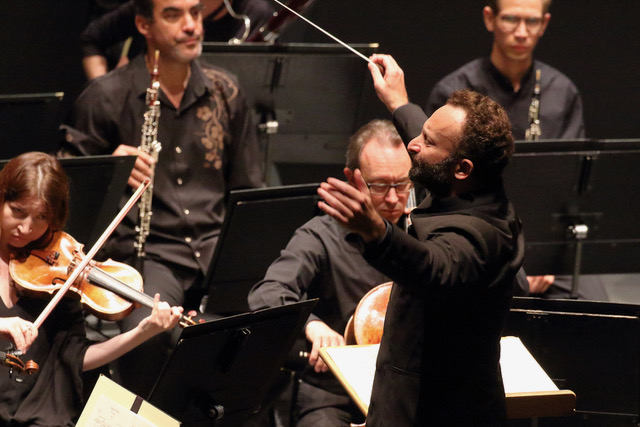 Germany Munich Opera Festival – Hermann Levi Memorial Concert: Emanuel Graf (cello), Johanni van Oostrum (soprano), Orchesterakademie des Bayerischen Staatsorchesters (Wagner), Bayerisches Staatsorchester (Brahms, Mozart, Bruch, Mendelssohn) / Kirill Petrenko (conductor). Prinzregententheater, Munich, 23.7.2021. (ALL)
Germany Munich Opera Festival – Hermann Levi Memorial Concert: Emanuel Graf (cello), Johanni van Oostrum (soprano), Orchesterakademie des Bayerischen Staatsorchesters (Wagner), Bayerisches Staatsorchester (Brahms, Mozart, Bruch, Mendelssohn) / Kirill Petrenko (conductor). Prinzregententheater, Munich, 23.7.2021. (ALL)

Wagner – Siegfried Idyll
Brahms – Tragic Overture, Op.81
Mozart – ‘Ihr Verwegnen … Wie der Felsen’ (from Così fan tutte, arranged and translated by Hermann Levi)
Bruch – Kol Nidrei for cello and orchestra, Op.47
Mendelssohn – Ruy Blas Overture, Op.95
Little has been written about the fact that, for the first time in their history, the Berlin Philharmonic appointed a chief conductor who was Jewish. There are a number of reasons for this, one being that Kirill Petrenko is not hungry for publicity and rarely speaks on anything which is unrelated to music. The other reason is that, while there exists some antisemitism on both extremes of the political spectrum in Germany – as in many other countries – it is a country where today affirming being Jewish is not such a big deal as in some others, where you are recommended not to walk wearing your kippa.
A few days ago at the Gasteig Philharmonie, the Jewish Chamber Orchestra Munich played at capacity within the constraints of the pandemic. They regularly give innovative programmes and have built up a regular and loyal audience who find it as normal to hear them as they do for other ensembles. Both evenings had in common the inclusion of a short but sharp speech by Charlotte Knobloch, former Vice-President of the World Jewish Congress.
For this special concert, Knoblauch and Bayerisches Staatsoper Intendant Nikolaus Bachler explained the significance of paying tribute to Hermann Levi, the first conductor of Parsifal and a leading figure so instrumental to the promotion of leading works which we hear today, whose legacy was damaged by the Nazis.
As an example of the tribute, Bachler announced that the ensemble of young players of the Munich company, the Orchesterakademie des Bayerischen Staatsorchesters would henceforth be called the Hermann Levi Orchesterakademie.
Kirill Petrenko led the thirteen young musicians in a subtly light-textured reading of Siegfried Idyll with a lovely acceleration in the middle part which highlighted the work’s structure. The young musicians re-joined the seasoned members of the orchestra for the later works. Brahms’s Tragic Overture had plenty of power. Once again, Petrenko proved very careful at managing the various tempi changes and his drive in the closing pages was exciting and theatrical.
Hermann Levi was a defender of Mozart’s operas. As was the custom in his day, works were performed in German in an arrangement he had made. Fiordiligi’s aria (from Così fan tutte) is challenging for all sopranos and the German text did not facilitate matters. South-African Johanni van Oostrum was glorious casting for this aria, she is a celebrated Elsa (Lohengrin) and has powerful high notes, plenty of colour and great care for the Mozartian line.
Max Bruch was not Jewish but he did write an Oratorio called Moses, as well as Kol Nidrei for cello and orchestra. Kol Nidre is a very important prayer which opens the Yom Kippur day of atonement. Had the pandemic not forced the cancellation of so many tours, Petrenko and the Berlin Philharmonic would have actually played this work in Tel Aviv as part of their European cities series. Emanuel Graf delivered the solo part with rich tone and with both an authoritative and meditative style that was a perfect fit for the work. For the pp closing pages, Petrenko was very attentive to the bow of his soloist so that, along with the orchestra, they could do a very moving decrescendo in complete harmony.
Felix Mendelssohn was the grandson of Moses Mendelssohn, founder of the Jewish Liberal movement who played a key role in the emancipation of Jews. His son Abraham, a banker, converted to Protestantism and is credited as having said that he used to be the son of his father, and now he was known as the father of his son (and he should also have included his daughter Fanny whose works are masterpieces we do not hear enough). To this day, the exact position of Felix Mendelssohn to Judaism remains an open question but the composer of the Reformation Symphony also composed Elias which are both amazing works. The Ruy Blas Overture had plenty of swagger. Munich’s Prinzregententheater is a small venue and allowed us to appreciate the quality of the sharp attack of the challenging string writing. There was again very exciting theatrical drive under Petrenko’s baton in this wonderful mercurial miniature. We may debate if Mendelssohn was of Jewish or Protestant faith but we there can be no debate that he was an amazing composer.
This concert started at 6pm and ended after just ninety minutes, leaving time for some of us to head home and be in time to light the Shabbat candles.
(Postscript: This review is dedicated to the memory of Lyn Clemo, a wonderful friend that I and many other music-minded friends, including Zurich-based Seen and Heard contributor John Rhodes, knew for more than 40 years. Lyn passed away just weeks ago from a sudden heart attack. In addition to being in our midst at the London’s Royal Festival Hall and Covent Garden, he accompanied many of us on musical trips to Bayreuth, Salzburg, Vienna, Berlin, Dresden, Prague, Munich, Moscow – the list is almost endless. His love of music was enormous, his disrespectful, mischievous sense of humour was a joy but above all, his heart was so big. This awful pandemic prevents us on the continent from now being at the side of his wonderful wife Christine, but she is in all our minds and hearts.)
Antoine Levi-Leboyer
